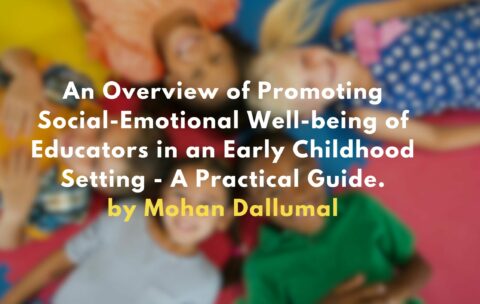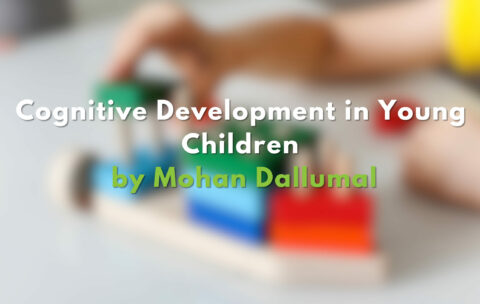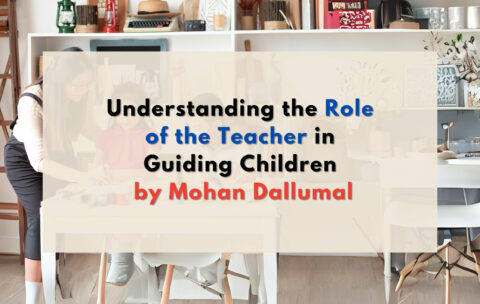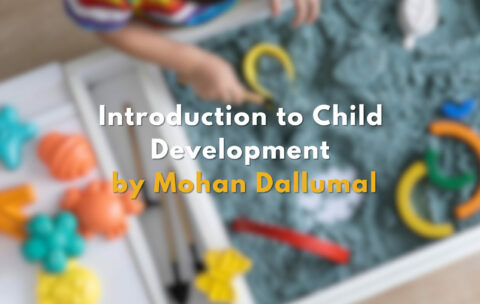JPNPP Series: An Overview of Promoting Social-Emotional Well-Being of Educators in an Early Childhood Setting – A Practical Guide (Part 1) by Mohan Dallumal
Promoting the social-emotional well-being of educators in early childhood settings …
What you'll learn
Positive Role Modeling: Educators prioritising their social-emotional well-being serve as positive role models for young children. By demonstrating healthy coping mechanisms, emotional regulation skills, and positive interpersonal relationships, educators help children develop similar behaviours.
Improved Classroom Environment: Educators with strong social-emotional well-being create a more positive and supportive classroom environment. This environment encourages trust, empathy, and open student communication, leading to better collaboration and learning outcomes.
Enhanced Student-Teacher Relationships: Educators who understand the importance of their social-emotional well-being are better equipped to build strong relationships with their students. These relationships are foundational for effective teaching and learning, fostering students' sense of belonging and security.
Reduced Burnout and Turnover: Prioritising social-emotional well-being helps prevent burnout and turnover among educators. By managing stress, maintaining work-life balance, and seeking support, educators can sustain their passion for teaching and remain committed to their profession in the long term.
Optimised Professional Growth: Understanding the importance of social-emotional well-being supports educators' ongoing professional growth. By engaging in self-reflection, seeking professional development opportunities, and fostering a supportive network, educators continuously improve their teaching practices and contribute to their success and that of their students.
Child Growth and Development by Mohan Dallumal (Course 3)
Course 3: Cognitive Development in Young Children Embark on a …
What you'll learn
Tailored Learning Experiences:
• Knowledge of cognitive development allows for the customisation of educational approaches, ensuring that teaching strategies align with a child's cognitive abilities and developmental stage.
Early Intervention for Challenges:
• Recognition of cognitive milestones enables early identification of potential developmental challenges, allowing timely intervention and support to address specific needs.
Effective Communication:
• Understanding cognitive processes helps adults communicate in age-appropriate and comprehendible ways for young children, fostering clear and meaningful interactions.
Promotion of Critical Thinking:
• Awareness of cognitive development supports the cultivation of critical thinking skills, problem-solving abilities, and logical reasoning, which are essential for academic success and lifelong learning.
Optimal Social and Emotional Support:
• Cognition is interconnected with social and emotional development. Knowledge of cognitive milestones allows caregivers to effectively support emotional regulation and healthy social interactions, contributing to overall well-being.
JPNPP Series: Understanding The Role of the Teacher in Guiding Children by Mohan Dallumal (Part 6)
Understanding the role of the teacher in guiding children is …
What you'll learn
Help educators to create a positive and safe learning environment for their students.
Help educators develop and implement effective teaching strategies.
Help educators to build stronger relationships with their students.
JPNPP Series: Understanding The Role of the Teacher in Guiding Children by Mohan Dallumal (Part 5)
Understanding the role of the teacher in guiding children is …
What you'll learn
Help educators to create a positive and safe learning environment for their students.
Help educators develop and implement effective teaching strategies.
Help educators to build stronger relationships with their students.
JPNPP Series: Understanding The Role of the Teacher in Guiding Children by Mohan Dallumal (Part 4)
Understanding the role of the teacher in guiding children is …
What you'll learn
Help educators to create a positive and safe learning environment for their students.
Help educators develop and implement effective teaching strategies.
Help educators to build stronger relationships with their students.
JPNPP Series: Understanding The Role of the Teacher in Guiding Children by Mohan Dallumal (Part 3)
Understanding the role of the teacher in guiding children is …
What you'll learn
Help educators to create a positive and safe learning environment for their students.
Help educators develop and implement effective teaching strategies.
Help educators to build stronger relationships with their students.
Child Growth and Development by Mohan Dallumal (Course 1)
Embark on a journey of discovery into the intricacies of …
What you'll learn
Informed Parenting: Understanding the stages of child development enables parents to make informed decisions about their child's upbringing. It helps parents anticipate and respond to their child's changing needs, fostering a more supportive and nurturing environment.
Effective Teaching and Education: Teachers who are knowledgeable about child development can tailor their teaching methods to match the developmental stage of their students. This personalised approach enhances the effectiveness of education, making it more engaging and suitable for each child's unique abilities and interests.
Early Identification of Developmental Issues: Recognising typical developmental milestones allows for early detection of potential developmental delays or issues. Early intervention addresses challenges and provides appropriate support to enhance a child's development.
Building Positive Relationships: Understanding child development helps adults, whether parents or educators, build stronger and more positive relationships with children. It allows adults to empathise with children's challenges and experiences at different stages, fostering better communication and trust.
Promoting Healthy Emotional Development: Knowledge of child development aids in creating environments that support emotional well-being. It allows caregivers to promote emotional regulation, empathy, and social skills, contributing to the child's overall mental and emotional health.
Enhancing Parenting and Caregiving Skills: Learning about child growth and development equips parents and caregivers with practical skills to meet a child's evolving needs. This includes effective communication, discipline strategies, and fostering independence, contributing to the child's overall well-being.
JPNPP Series: Understanding The Role of the Teacher in Guiding Children by Mohan Dallumal (Part 2)
Understanding the role of the teacher in guiding children is …
What you'll learn
Help educators to create a positive and safe learning environment for their students.
Help educators develop and implement effective teaching strategies.
Help educators to build stronger relationships with their students.





